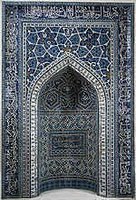
Predisposition for violence is circumstantial and should not be taken as inevitable. This is what we can logically conclude through a simple exercise mixing history and philosophy. Let's add two and two. Take the different but inter-related Abrahamic religions of Islam and Christianity.
When in the 14th and 15th century Christianity's actors in Europe were assailed by corruptions, morally regrettable indulgences and the inhumane terrorism of the inquisition (pursuing all those who were perceived as heretics), its reigning dogmas came to be challenged and reassessed. The reformation led by Martin Luther brought about new spiritual movements, generating a debate over the inherent deficiencies in the power structures of Christianity and over the violence of its methods and inhumanity of its fundamentalism. The debate brought revisions, reactions, changes and it signalled the definite end of the middle ages, it was ultimately a crucial moment in the path of what is today supposedly regarded as a “civilized”, sophisticated religion (this is obviously very arguable, just look at some writings of Christian Right intellectuals or some points of the project for the New American Century). The point is that if you look at Islam - a religion whose origins trace back to the 7th century, withheld by one fifth of the world population – you see a religion that, just like Christianity, has gone through huge historical transformations.
Sirat in Arabic means street, “the good street”, a central concept in the writings of the Qur'an. Sirat in Arabic knows no plural, theological debates are held discussing the claims for the uniqueness of “the good street” and the possibilities of it not being the only “good street” but actually “a good street”. In effect, the Sharia law for example, witnessed vast sets of transformations and the pinnacles of Islam have gone through revisions and distinct sets of group constructions. It is easy to forget that Islam is not just the Islam of violent fundamentalism but also the Islam of ijtihad (independent interpretation) – the Islam of Humanism, Feminism, Secularism and Tolerance. The Islam that flourishes in the process of finding and not in the applications of supposed absolutes. In the same way Christianity found its different roads at the end of the protestant reformations so does Islam need to set out on a politically backed intellectual pilgrimage, recovering its ancient “good streets” and allowing an enlightenment and connection of all the badly lit streets contemporary moderate religious groups seem to be roaming through.
1 comment:
congratulations for your blog; full of potential
Post a Comment